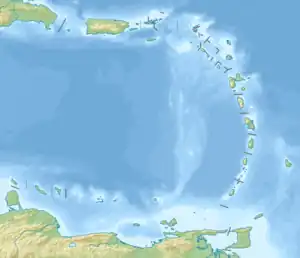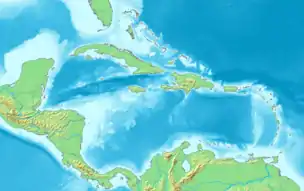Île Fourchue
Île Fourchue, also known as Île Fourche is an island between Saint-Barthélemy and Saint Martin, belonging to the Collectivity of Saint Barthélemy. The island's inside is privately owned. It is located about 5 km north-west of the island of Saint Barthelemy. Previously, Fourchue Island was called Five Islands because of prominent five peaks visible from the distance. The highest point is 103 meter above sea level. It is situated within Réserve naturelle nationale de Saint-Barthélemy.[2]
Nickname: Five Islands | |||||||||||||||||
|---|---|---|---|---|---|---|---|---|---|---|---|---|---|---|---|---|---|
 Île Fourchue, with Petite Islette at bottom right | |||||||||||||||||
 Île Fourchue  Île Fourchue  Île Fourchue | |||||||||||||||||
| Geography | |||||||||||||||||
| Location | Caribbean | ||||||||||||||||
| Coordinates | 17°57′30″N 62°54′00″W | ||||||||||||||||
| Archipelago | Leeward Islands, Lesser Antilles | ||||||||||||||||
| Adjacent to | Saint Barthélemy Channel | ||||||||||||||||
| Area | 0.99 km2 (0.38 sq mi) | ||||||||||||||||
| Highest elevation | 103 m (338 ft)[1] | ||||||||||||||||
| Administration | |||||||||||||||||
| Demographics | |||||||||||||||||
| Population | 0 | ||||||||||||||||
| Additional information | |||||||||||||||||
| Time zone | |||||||||||||||||
| |||||||||||||||||
History
Fourchue Island is known as the retreat of Balthazar Biguard, an immigrant from Marseille fleeing the French Revolution, Saint-Barthélemy being at that time Swedish territory. He ended up acquiring Swedish citizenship, living apart from the rest of the world until he died in 1827 at the age of 85. He is buried on this island.[3]
Important Bird Area
Petite Islette, a 1.3 ha, 33 m high, islet at the western end of Fourchue, has been recognised as an Important Bird Area (IBA) by BirdLife International because it supports a breeding colony of brown boobies. Three species of reptiles are present: the Lesser Antillean iguana (endemic of the Lesser Antilles), Anguilla anole and Caribbean ameiva.[4]
References
- "Ile Fourchue". Wikimapia. Retrieved 28 June 2014.
- A description of the island
- Tingbrand, Per (2001). Who Was Who in St. Bartholomew during the Swedish epoch? (3th revised ed.). Swedish St. Barthélemy Society. p. 97-98.
- "Petite Islette". BirdLife Data Zone. BirdLife International. 2020. Retrieved 18 December 2020.